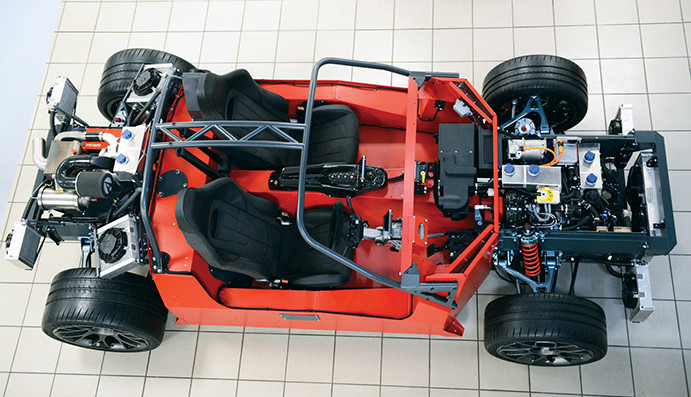Ariel Hipercar: electric vehicle hits 100 km/h in 2.5 s

The Ariel Motor Company based in Somerset, England has released details of a new two-seat electric sports vehicle that ticks all the boxes. With 1,180 hp on tap the 4-wheel drive variant hits 100 km/h in 2.5 s and 160 km/h in 3.8 s. A small 35 kW on-board gas turbine generator can recharge the drive batteries and allow the vehicle to travel independent of charge points.
The Ariel Motor Company based in Somerset, England has released details of a new two-seat electric sports vehicle that ticks all the right boxes. With 1,180 hp on tap the 4-wheel drive variant hits 100 km/h in 2.5 s and 160 km/h in 3.8 s. A small 35 kW on-board gas turbine generator can recharge the drive batteries allowing the vehicle to travel independent of charge point availability.
The Ariel Hipercar project started life as a research initiative to design a low energy vehicle. The resulting vehicle turned out to be radically different and the company is now in receipt of £ 2 million ($ 2.8 million) funding to help develop the Hipercar project. The vehicle will be available as a 2-wheel or 4-wheel drive version. Each driven wheel has an inboard electric motor supplying power via integral, single speed step-down gearboxes. The motor magnets are radially distributed around the outside of the rotor to achieve a particularly high torque density and reduce mass of the moving parts. Each motor develops 220kW (295bhp) and 450Nm (332 ft lb) of torque. This gives the 4-wheel drive variant a total of 1,180 hp (Total torque: 1800 Nm).
The car is a Series Hybrid EV (Electric Vehicle) featuring a 750 Volt, 42 kWh or 56kWh, lithium-ion, temperature controlled (using a water-glycol system) battery pack which can be charged, when necessary, by an efficient on-board 35kW micro-turbine range-extender generator developed by Delta Motorsport. This facility should resolve any range-anxiety issues and allow the vehicle to operate independent of a charge-point infrastructure.
According to the company “it will be an expensive car because of the technology involved but when compared to £1m+ supercars (which it will outperform) it’s going to represent excellent value for money. This is the first true electric supercar that will cross continents, drive to town and lap a race track”. The first production model is planned for the coming year and series production is scheduled to begin in 2020.
The Ariel Hipercar project started life as a research initiative to design a low energy vehicle. The resulting vehicle turned out to be radically different and the company is now in receipt of £ 2 million ($ 2.8 million) funding to help develop the Hipercar project. The vehicle will be available as a 2-wheel or 4-wheel drive version. Each driven wheel has an inboard electric motor supplying power via integral, single speed step-down gearboxes. The motor magnets are radially distributed around the outside of the rotor to achieve a particularly high torque density and reduce mass of the moving parts. Each motor develops 220kW (295bhp) and 450Nm (332 ft lb) of torque. This gives the 4-wheel drive variant a total of 1,180 hp (Total torque: 1800 Nm).
The car is a Series Hybrid EV (Electric Vehicle) featuring a 750 Volt, 42 kWh or 56kWh, lithium-ion, temperature controlled (using a water-glycol system) battery pack which can be charged, when necessary, by an efficient on-board 35kW micro-turbine range-extender generator developed by Delta Motorsport. This facility should resolve any range-anxiety issues and allow the vehicle to operate independent of a charge-point infrastructure.
According to the company “it will be an expensive car because of the technology involved but when compared to £1m+ supercars (which it will outperform) it’s going to represent excellent value for money. This is the first true electric supercar that will cross continents, drive to town and lap a race track”. The first production model is planned for the coming year and series production is scheduled to begin in 2020.
